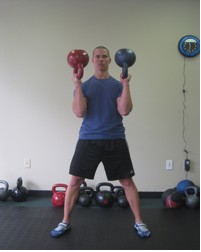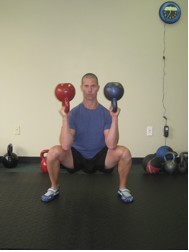Sweat the Small Stuff
Tim Anderson, RKC II
February 10, 2010 01:26 PM
I have heard BRETT JONES say on different occasions that people stack fitness on top of dysfunction. I think he even tried to tell me that I was putting a 500 HP engine inside a Nissan when it came to my own body. I'm not sure what he meant by that as I like to think of myself more as a Mustang. Anyway, I think that was Brett's way of saying I have some movement issues. Most of us do.
As trainers, we gather a whole host of tools that enable ourselves to train our clients safely and effectively. Tools like the CK-FMS and Z-Health allow us to help restore a solid foundation of strength, mobility and function for ourselves and our clients.
My question is do we practice what we preach? Or do we at least practice what we know? In our own training, are there issues/limitations that we ignore and train through? Are we stacking fitness on top of dysfunction? If so, why?
I think sometimes we train with dysfunction because its just not sexy to work on movements or weaknesses. Lifting heavy weights overhead makes us feel strong while practicing an active straight leg raise does not increase our testosterone. Our egos often get in the way and lead us down a spiraling road of injury and lost training time, yet we continue to do it again and again.
I've heard Dr. Eric Cobb say on more than one occasion, "there is always a price to pay." If we continue to train with dysfunction, what will that lead to? What type of injury might we expect? One thing is certain, I can never reach my full athletic potential until I address my own issues and limitations. Whether you're a professional athlete, a professional trainer, or just a training warrior you will not unlock your true potential without addressing the "smaller" stuff like poor movement or loss of movement.
This message has really hit home for me over the last few years. I was constantly getting injured from my training. I would make some progress, get injured, lose progress, "heal" and then repeat the whole cycle. It wasn't that my training was bad, it was more that my body was not ready for my training. I had some movement issues that needed to be addressed. After I addressed these issues by learning how to move better (thanks to Z-Health and CK-FMS), my training really took off. I've been fairly injury free and my strength has risen to a new level. It is the small things like joint mobility or movement patterns that can unlock the door to having good health and "functional" strength.
Another tool I added to my training that has made a huge difference is
self-limiting exercises. I heard Gray Cook mention performing self-limiting exercises to strengthen the body's weaknesses. Gray defined a self-limiting exercise as an exercise that requires you to stay "on" the whole time, and/or an exercise that will hurt if you perform it wrong. One example he used for self-limiting exercises was the double bottoms up clean to a deep squat. Gray said it really connects the grip to the core. He was right. I started doing these, and other self-limiting exercises such as the Turkish Get-up and single leg dead lifts, and my strength has gone through the roof.


I started out with these exercises using weights far below what I normally trained with, but after 2 months even the weights I used for these exercises has become respectable; self-limiting or not. My body is way more connected now than it has ever been and I feel better than I have in years. All because I started sweating the small stuff.
So the question is: Do you have areas you need to work on? For example, Do you perform Turkish Getups with the 32 kg when you should be using the 16 kg? Are you focusing on the movement, or are you focusing on the number of reps? Are your hip flexors too tight to allow you to perform a proper swing? Do you continue to press even though your shoulder mobility is less than great? Can you squat without your knees bowing in?
If your goal is to truly be fit, and to reach your potential, work on your weaknesses. Don't cover them up. Sometimes this means letting go of egos and working on the little things, whatever they might be. Joint mobility work, working on movement patterns and movement restrictions, performing self-limiting exercises; these are all great ways to lay down a solid foundation in your training. There is even a Bible song about the wise man who builds his house upon the rock and the foolish man who does not. Having a solid foundation is the key to unlocking your full potential.
Tim Anderson is and RKC II, Z-Health R, I, S, T certified, and a professional firefighter in Cary, NC. He has also been a certified personal trainer for over eleven years. He loves teaching people how to move with kettlebells! You can check him out at www.OPTfitness.net or email him at TAsfitness@earthlink.net.
Back